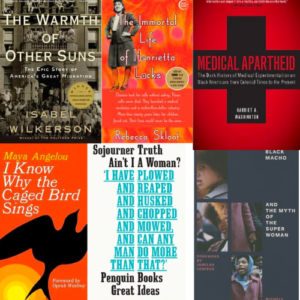|
Getting your Trinity Audio player ready...
|
Introduction
Black women have written countless powerful books about Black history that we should read. You’ve come to the right website if you’re looking for powerful and enlightening books about Black history published by Black women. I’ve gathered a list of 12 must-read non-fiction titles (not in order of recommendation) that provide distinctive viewpoints on Black history and the experiences of Black women in this blog post. These books cover a variety of subjects and eras, from memoirs and biographies to scholarly works and social commentary, focusing light on significant tales and perspectives that are frequently ignored in dominant narratives. These books will inform, excite, and challenge you whether you’re a history enthusiast or just trying to expand your reading horizons.
I have personally read some of the most popular books that have been made into films, like Hidden Figures and I Know Why the Caged Birds Sing. I
I am embarrassed that I haven’t read Sojourner Truth’s “Aint I a Woman” since it is so historical, but I just ordered that one. The two books I am looking forward to reading after that from this independent local bookstore are Medical Apartheid: The Dark History of Medical Experimentation on Black Americans from Colonial Times to the Present. I have read and researched so much about this horrible historical experiment with black people, but I am interested in discovering more. The second book is The Warmth of Other Suns: The Epic Story of America’s Great Migration because I live in Chicago and believe it’s an essential read.
12 non-fiction books about Black history written by Black women.
Audre Lorde’s “Sister Outsider” In this collection of essays and speeches, Lorde examines issues including race, gender, and sexuality while sharing her experiences as a black lesbian feminist and activist.
Michelle Alexander’s “The New Jim Crow” In this well-known work, Alexander makes the case that the US criminal justice system upholds a form of racial segregation that is similar to the Jim Crow laws of yesteryear.
“Assata: An Autobiography” by Assata Shakur: In this memoir, Shakur recounts her experiences as a Black Panther and member of the Black Liberation Army, as well as her political activism and eventual exile to Cuba.
Margot Lee is the author of “Hidden Figures: The American Dream and the Untold Story of the African Women Mathematicians Who Helped Win the Space Race.” Shetterly: In spite of discrimination and segregation, this book chronicles the experiences of black women who worked as mathematicians at NASA during the space race.
Margo Jefferson’s memoir “Negroland: A Memoir”: In her memoir, Jefferson examines issues like class, race, and identity while reflecting on her experiences growing up in Chicago’s black elite during the 1950s and 1960s.
This book reveals Patrisse’s visionary and courageous activism, and we are forced to acknowledge the consequences of our nation’s decision to criminalize a generation.
The first complete history of Black America’s shocking mistreatment as unwilling and unwitting experimental subjects at the hands of the medical establishment. This masterful book is a must-read for anyone concerned with public health and racial justice.
During the twentieth century, three black Americans fled the South for the North and West in search of a better life in “The Warmth of Other Suns: The Epic Story of America’s Great Migration” by Isabel Wilkerson. Wilkerson weaves their personal stories with historical context to illuminate the broader social and political forces that drove the Great Migration.
Maya Angelou’s debut memoir is a modern American classic beloved worldwide. PBS’s American Masters aired the documentary, And Still I Rise about her life.
“The Immortal Life of Henrietta Lacks” by Rebecca Skloot: A black woman’s cancer cells were taken and used for medical research without her consent, leading to major scientific breakthroughs and raising ethical questions about informed consent and medical privacy.
Michele Wallace’s “Black Macho and the Myth of the Superwoman” critiques the sexist and racist assumptions underlying the Black Power movement and the broader feminist movement.
A collection of the most iconic words of Sojourner Truth, including her famous words from the Akron Women’s Rights Convention of 1851
Conclusion
In conclusion, the 12 non-fiction works on Black history published by Black women provide an essential and compelling viewpoint on the experiences, challenges, and victories of Black people throughout history. These authors highlight the frequently underappreciated efforts and accomplishments of Black women and their communities through their stories and research.
Their writings force us to confront the systematic racism, and oppression Black people still experience in modern society. By reading and learning from these works, we may increase our knowledge of the Black experience and work to create a more just and equitable future.
These books are crucial for non-Black people to learn about and respect diversity and for Black people to connect with their history and identity.
Please comment below if you have any additional recommendations for non-fiction works of black history by black women.


